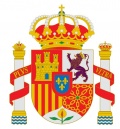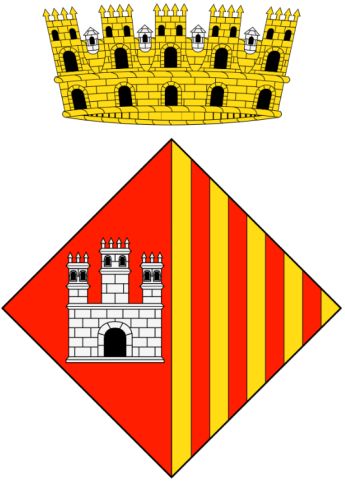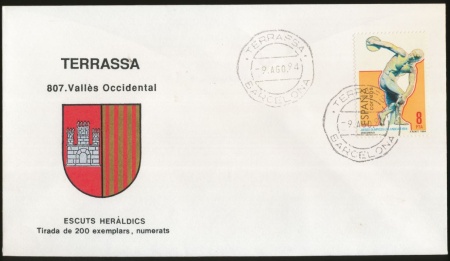Terrassa: Difference between revisions
Knorrepoes (talk | contribs) m (Text replacement - "[[Category:Spanish Municipalities" to "50 px|link=Spain[[Category:Spanish Municipalities") |
Knorrepoes (talk | contribs) No edit summary |
||
| Line 20: | Line 20: | ||
The local castle is the traditional sign of the city arms and seals since medieval times; the coat of arms shows also the royal arms of Catalonia-Aragon (four pales Gules on Or). | The local castle is the traditional sign of the city arms and seals since medieval times; the coat of arms shows also the royal arms of Catalonia-Aragon (four pales Gules on Or). | ||
{|align="center" | |||
|align="center"|[[File:807.eha.jpg|center|450 px|Escudo de {{PAGENAME}}]] <br/>The arms on an [[Spain (stamps)|heraldic cover]] (1994) | |||
|} | |||
{{media}} | {{media}} | ||
Revision as of 07:40, 14 January 2018
Spanish heraldry portal
This page is part of the Spanish heraldry portal |
Heraldry of the World |
|
Civic heraldry:
|
Other heraldry: |
TERRASSA
Region : Catalonia
Province : Barcelona
Official blazon
Escut caironat partit: 1r de gules, un castell d'argent tancat de sable; 2n d'or, 4 pals de gules. Per timbre, una corona mural de ciutat.
Origin/meaning
These arms have been officially granted on 27th July 1988.
Terrassa was a Roman municipality in 139 B.C. called Egara. It was the centre of an important diocese, with the Visigothic-Romanesque churches of Sant Pere, Santa Maria and Sant Miquel (6th century, rebuilt in the 12th century). This bishopric disappeared after the Muslim invasion.
In the first times of the Christian conquest, the castle of Terrassa (9th century) was near the frontier with the Muslim territories, and focused an agricultural and commercial town that grew around it. In 1110, the count-king Ramon Berenguer III facilitated the construction of another fortress in the town, that in 1344 became the Carthusian monastery of Vallparadís. The walls were built by privilege of the king Peter III in 1366; in 1560 the town began to grow outside the enclosure.
In the 19th century the Industrial Revolution took place in the town, that became one of the main Catalan textile centres (wool, cotton, knitwear, dressmaking, artificial fibres). Textile industry, together with metallurgy, is still the main economic resource in the city.
The local castle is the traditional sign of the city arms and seals since medieval times; the coat of arms shows also the royal arms of Catalonia-Aragon (four pales Gules on Or).
| The arms on an heraldic cover (1994) |
Contact and Support
Partners:
Your logo here ?
Contact us
© since 1995, Heraldry of the World, Ralf Hartemink 
Index of the site
Literature : Image taken from Wikipedia; background from Enric Fontvila, Barcelona.














